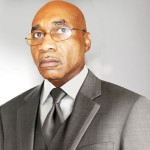
It is no longer surprising that this author and television host, Tavis Smiley shows up during presidential campaign periods with either a new book on Black votes, or announces an “advocacy tour on poverty”.

In the 2008 presidential campaign, for instance, he took advantage of the campaign period to promote his book “The Covenant with Black America.” Again, just before the 2012 Presidential Election, Smiley felt that, late in 2011 was a good time to bargain his personal interests with the voting public. He then teamed up with another confused activist and a Princeton professor, Cornel West to resume what they called ‘Poverty Tour.’ This project crashed.
This has been the regular trend for Smiley, and so, the present presidential season (2016), is no different. Just a few days ago, Smiley showed up with another “attention-grabber”, in his usual fashion, to intimidate the candidates with a so called “Black Votes” designed to woo them with non-existent demographic theories.
He spoke to Yahoo News and Finance Anchor, Bianna Golodryga about his new book, “50 for Your Future: Lessons from down the Road,” and offered unsubstantiated thoughts about the state of the 2016 presidential campaign, and where the candidates stood with black voters. Among all Presidential candidates, Smiley thinks that Bernie Sanders was the only trusted candidate because he was clear on talking about poverty, income inequality, and economic immobility. Then on President Obama’s legacy in terms of race and Black America, Smiley said, “Historians are going to have a hard time trying to juxtapose this reality – how, in the era of the first black president, the bottom fell out for black America.”
The issues about candidates and the prevalent political landscape are not complicated at all. People are listening. From women, the youth, Hispanics, to other demographic segments, the electorates are watching the candidates and are making decisions based on their specific interests. Therefore, African Americans might not need any middleman or agent to assist them with making their choices about the candidates.
Whereas every individual has a right to his or her communal advocacy, we must be clear in categorizing our roles as community leaders and activists, to ensure that it actually serves public interests, as against selfish interests. Credible community activists always put the community first. This is why famous activists like Martin Luther King, Malcolm X, W.E.B. Du Bois, Harriet Tubman, Ruby Bridges, Rosa Parks, and thousands of others secured special positions in the Nation’s history of civil rights, social, and political actions.
These days, however, with individuals like Smiley, the practice of community advocacy has been distorted into a bargaining venture for greener pastures. It has become a ground for unscrupulous media opportunists, composing falsehood and instigating uncertainty, while they take advantage of their vulnerable communities to pursue self-centered political careers or business interests. It is appalling to note, that Smiley only goes public with his campaigns to coincide with the general election, and they are usually tagged to either a book launch, or an aimless “poverty” tours.
In the 2008 electioneering season, he had set up web sites and organized discussion forums, claiming that his book, “The Covenant with Black America” was a national plan of action to address the primary concerns of African Americans – from health to housing, from crime to criminal justice, from education to economic parity. In a despicable show of desperation and intoxication for recognition, Smiley tried to use this shambolic setup against a presidential campaign that featured the first African-American presidential nominee by any major party. That wicked plan also failed miserably.
With individuals like Smiley, the practice of community advocacy has been distorted into a bargaining venture for greener pastures. It has become a ground for unscrupulous media opportunists, composing falsehood and instigating uncertainty, while they take advantage of their vulnerable communities to pursue self-centered political careers or business interests.
As if that was not enough, Smiley showed up again just before the 2012 Presidential Election, to resume his President Obama witch-hunting. He teamed up with another confused activist, and a Princeton professor, Cornel West to initiate their so called ‘Poverty Tour.’ Both Smiley and West said they hoped to jump-start a national conversation about poverty and political action in four battleground states before the elections. This tour crashed because it had no significant mission, but was created out of selfishness; to threaten the political landscape with their sham “Black vote” crusade and take advantage of the moment.
The campaign season is here again. The priority for any credible community advocate that is passionate about the African-American communities should be how to inspire the community’s collective civic participation in the socio-political process. Activists and Community advocates should be concerned about preparing their community for massive voter-turnouts. Community Advocates who are genuinely interested in their communities should, most definitely not be taking advantage of voter vulnerability by selling books, or swaging uncorroborated poll theories. The one thing that is crystal clear in this constant, consistent, and predictable display of desperation is that Smiley does not represent anybody or the community he claims to promote. Smiley represents himself alone. Using the concerns of the African American community as a trick to bargain political interests or boost a shaky media career would further cripple his credibility.

Leave a Reply